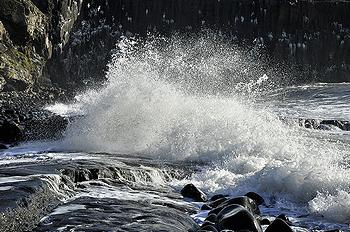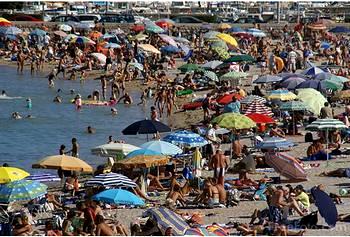Warming Oceans Encourage Explosion of Dangerous Bacteria
BRUSSELS, Belgium, September 13, 2011 (ENS) - Climate change is warming ocean waters, causing the spread of bacteria predicted to cost millions in health care as people are exposed to contaminated food and water and to marine diseases at work or at play.
The warning is expressed in a paper released today by European scientists in advance of a two-day conference in Brussels on the effects of climate change on the marine environment.
Project CLAMER, which stands for Climate Change and European Marine Ecosystem Research, a collaboration of 17 European marine institutes, issued the 200-page synthesis of more than 100 EU-funded projects published since 1998, together with a public opinion survey, a new book based on the scientific findings, and a major new documentary film to be featured at CLAMER's meeting September 14-15 in Brussels.

(Vibrio electron microscope image by Janice Carr courtesy CDC)
Vibrio vulnificus lives in warm seawater and can sicken those who eat contaminated seafood or have an open wound exposed to contaminated seawater. 50 percent of V. vulnificus bloodstream infections are fatal.
"Millions of euros in health costs may result from human consumption of contaminated seafood, ingestion of water-borne pathogens, and, to a lesser degree, through direct occupational or recreational exposure to marine diseases. Climatic conditions are playing an increasingly important role in the transmission of these diseases," says the CLAMER paper.
A team of researchers from Italy, the UK, Germany and the United States has found that warmer ocean water is causing a proliferation of bacteria from a genus known as Vibrio, among the most dangerous of all bacterial pathogens, which can produce serious illnesses such as gastroenteritis, septicemia and cholera.
Some types of the bacteria and micro-algae are linked to shellfish-associated food poisoning deaths. Others harm marine animals, including mollusks and fish, "with major economic and environmental impacts," the researchers say.
The paper reports "an unprecedented increase in the number of bathing infections that have been associated with warm-water Vibrio species in Northwest Europe," and a "globally-increasing trend in their associated diseases."
"We have amassed convincing and disturbing scientific evidence," says CLAMER co-ordinator Carlo Heip, director of the Royal Netherlands Institute for Sea Research. "We need to communicate it much better than we have."
"We must all heed the clear warnings of the hazards we face from what amounts to an uncontrolled experiment on the marine environment," said Heip.
While the study was based on seawater samples taken near the mouth of Europe's Rhine River and Britain's Humber River, "the increasing dominance of marine Vibrios, including pathogenic bacterial species, may very likely occur in other areas around the world," the paper warns.
The authors write, "We provide evidence that Vibrios, including the cholera species, increased in dominance within the plankton-associated bacterial community of the North Sea during the past 44 years and that this increase is correlated significantly with climate induced sea surface warming during the same period. ... Ocean warming is favouring the spread of Vibrios."

Crashing waves at Howick, England (Photo by Andrew Kearton)
Co-ordinated by the Marine Board of the European Science Foundation, with contributions from more than 20 scientists, the CLAMER synthesis and related book, examine the environments of the North Sea, Baltic Sea, Arctic Ocean, northeast Atlantic Ocean, Mediterranean Sea and the Black Sea.
The research captures a host of documented and forecast physical, chemical and biological marine changes with far-reaching consequences, including sea-level rise, coastal erosion, melting ice, storm frequency and intensity, physical changes including the North Atlantic circulation system, chemical changes such as acidification and deoxygenation, changes in marine life patterns, and the ultimate impacts of all this on humans - both social and economic.
Sea level rise, combined with higher waves in the North Atlantic and more frequent and severe storms, threaten up to one trillion euros worth of Europe's physical assets within 500 meters of the shore. And some 35 percent of Europe's GDP is generated within 50 kilometers of the shore, the synthesis notes.
"Sea-level rise of 80 to 200 cm could wipe out entire countries ... causing sea floods, massive economic damage, large movements of populations from inundated areas, salinity intrusion and loss of wetlands including the ecosystem services that they provide," the paper warns.
More frequent and intense storms are projected for Northern Europe, especially in a band running from the south of England through northern France, Denmark, northern Germany and Eastern Europe.
Annual damages are expected to rise 21 percent in the UK, 37 percent in Germany and 44 percent across Europe as a whole, with a 104 percent rise in losses from one-in-100 year storms.
In the public opinion poll that accompanies the paper, worried citizens say their main concerns are sea level rise and coastal erosion.
While respondents said they are taking personal actions to reduce carbon emissions, they blame climate change on other groups of people or nations.
They assign responsibility for mitigating the problem to governments and industry, although they perceive government and industry as ineffective on these issues.

Crowded beach at Menton on the French Riviera (Photo by Ian Britton courtesy FreeFoto.com)
The online survey of 10,000 residents of 10 European countries - 1,000 each from Spain, Italy, Germany, France, Czech Republic, Netherlands, Ireland, United Kingdom, Norway and Estonia - reveals widespread concern about climate change, led by worries about sea level rise and coastal erosion.
Conducted in January by Brussels-based TNS Opinion, the survey is the first of its kind to focus on public perceptions of climate change impacts at the coast or in the sea.
Asked to select from a list the single most serious problem facing the world, 18 percent of respondents chose climate change, the second highest choice.
By comparison, poverty and lack of food and drinking water was chosen by 31 percent, international terrorism by 16 percent, and a global economic downturn by 12 percent.
Concern about climate change is undiminished since a September 2009 Euro-Barometer survey conducted for the European Union, despite the cool winter of 2010 in Northern Europe and Climategate attacks on the Intergovernmental Panel on Climate Change and climate scientists.
Some 86 percent of respondents said climate change is caused entirely, mainly or in part by human activities. Only eight percent thought it is mainly or entirely caused by natural processes. In the United States, around 32-36 percent hold this view.
Scientists working in universities or for environmental NGOs are trusted as a source of information about climate change impacts in the seas and ocean far more than government scientists or those working for industry.
Men distrust all of the organizations and individuals listed more than women do, and in almost all cases, people over 35 expressed more distrust than those aged between 18 and 34.
Personal actions taken by European citizens in response to marine climate change issues are shown to focus more on mitigating climate change, such as reducing energy use and using sustainable forms of transport, than adapting to its impacts, through protecting homes from flooding, for example.
Public support for actions by national governments and the European Union is shown to be highest for policies to protect and enhance marine environments, such as tightening controls on pollution and reducing carbon emissions, while measures to adapt to the impacts of climate change are ranked the lowest.
Copyright Environment News Service (ENS) 2011. All rights reserved.
